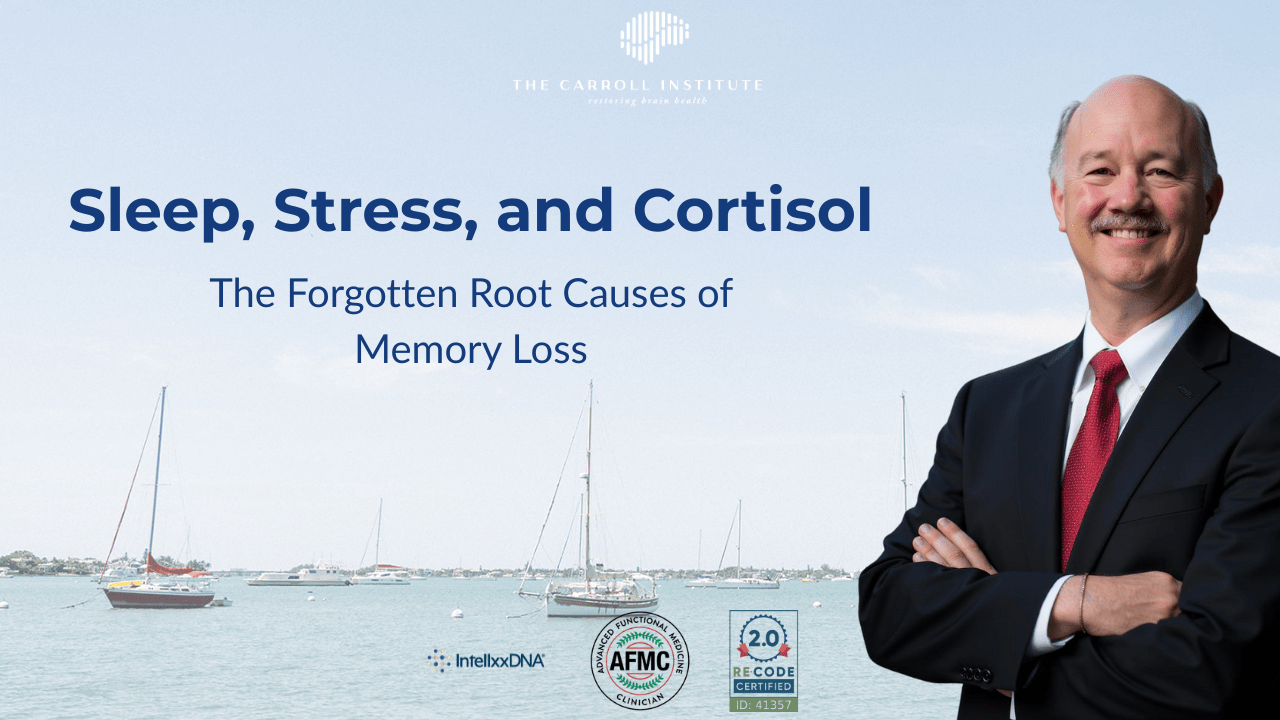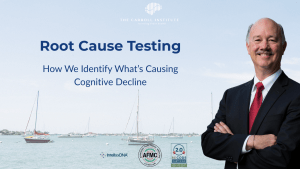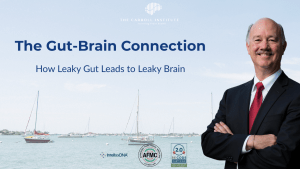Last Updated: October 2025
When people begin noticing brain fog, poor focus, or memory lapses, they often blame age, genetics, or even diet. Yet one of the most overlooked causes of cognitive decline is something we all experience daily: chronic stress and poor sleep. When the body’s stress response stays “on” for too long, the resulting hormonal imbalance can directly damage the brain—especially the hippocampus, which is responsible for memory formation and emotional regulation.
At The Carroll Institute in Sarasota, Dr. Garland Glenn, DC, PhD, AFMC uses advanced Functional Medicine testing to assess cortisol rhythms, stress hormone balance, and sleep quality. Addressing these root causes through the Bredesen ReCODE Protocol helps patients restore clarity, focus, and calm.
The Stress Hormone That Steals Memory
Cortisol is the body’s primary stress hormone, released by the adrenal glands in response to physical or emotional stress. In small amounts, it’s beneficial—it helps you wake up, stay alert, and respond to challenges. However, when cortisol levels remain high for too long due to chronic stress, it becomes toxic to neurons.
According to research published in the Learning & Memory, prolonged elevation of cortisol shrinks the hippocampus, the brain’s memory center, and interferes with the formation of new neural connections. Over time, this can lead to anxiety, brain fog, depression, and cognitive decline.
How Sleep Loss Fuels Brain Inflammation
Sleep is when your brain detoxifies itself. During deep sleep, a system called the glymphatic system clears away metabolic waste and beta-amyloid—the same sticky protein found in Alzheimer’s plaques. When sleep is cut short, this cleaning process is interrupted, allowing toxins and inflammation to accumulate in the brain.
Even a few nights of poor sleep can raise cortisol, increase insulin resistance, and impair focus. Over time, chronic sleep deprivation leads to oxidative stress and accelerates aging in the brain. This is why individuals with sleep apnea, insomnia, or irregular schedules are at greater risk for memory loss and neurodegeneration.
The Cortisol Rhythm — Why Timing Matters
Healthy cortisol levels follow a natural rhythm: high in the morning to help you wake up, then gradually lowering through the day and dropping at night so your body can rest. Unfortunately, chronic stress, poor diet, late-night screen use, and blood sugar imbalances disrupt this rhythm, creating what’s known as a “flattened cortisol curve.”
This hormonal imbalance makes it difficult to fall asleep at night and stay energized during the day. It also creates inflammation in the brain and suppresses the production of melatonin, serotonin, and growth hormone—all essential for mental clarity and emotional stability.
Functional Medicine Testing for Sleep and Stress
At The Carroll Institute, Dr. Glenn performs Functional Medicine testing to evaluate stress response and sleep physiology, including:
- Four-point cortisol testing: Measures cortisol levels throughout the day to assess adrenal rhythm.
- DHEA and pregnenolone testing: Evaluates adrenal resilience and hormone precursors.
- Melatonin levels: Identifies circadian rhythm disruption.
- Heart rate variability (HRV): Assesses how well your nervous system adapts to stress.
- Sleep quality and oxygen monitoring: Screens for apnea or oxygen deprivation during sleep.
These insights help pinpoint whether your brain is under chronic stress, deprived of restorative sleep, or struggling with circadian imbalance.
How Chronic Stress Impacts the Brain
When cortisol and adrenaline dominate for too long, they activate the brain’s microglial cells—the immune cells responsible for inflammation. This inflammation damages neurons, reduces blood flow, and impairs neuroplasticity. In other words, it prevents your brain from repairing and creating new connections. Chronic stress also depletes nutrients like magnesium, B vitamins, and omega-3 fatty acids that are critical for brain resilience.
Over time, this creates what researchers call a “neuroendocrine storm,” where hormonal imbalance, inflammation, and oxidative stress feed into one another, accelerating cognitive decline.
Rebuilding Brain Resilience Through Sleep and Stress Recovery
Fortunately, the brain is highly adaptable. When sleep and stress are restored to balance, cortisol levels normalize, inflammation subsides, and the brain begins to rebuild neural pathways through neuroplasticity. At The Carroll Institute, this process often includes:
- Adrenal restoration protocols: Adaptogenic herbs, nutrients, and lifestyle changes to support healthy cortisol rhythms.
- Sleep optimization: Melatonin support, sleep hygiene, and oxygen evaluation for apnea.
- Mind-body therapies: Guided breathing, vagal tone exercises, and mindfulness to reduce sympathetic overdrive.
- Diet and blood sugar support: Low-inflammatory, high-protein meals to stabilize cortisol and mood.
- Functional Neurology therapies: Cognitive retraining and balance exercises that promote parasympathetic recovery.
Sleep and Stress in the ReCODE Framework
In the Bredesen ReCODE Protocol, chronic stress and poor sleep represent key contributors to cognitive decline. They drive both inflammation and metabolic dysfunction—two of the six major subtypes of Alzheimer’s disease. Restoring circadian rhythm, stabilizing cortisol, and improving deep sleep are therefore essential to reversing cognitive decline and protecting long-term brain health.
Take Control of Stress, Sleep, and Brain Health
If you’re struggling with fatigue, mood swings, or forgetfulness, your body’s stress hormones may be out of balance. Fortunately, with the right testing and support, these imbalances can be corrected—often leading to dramatic improvements in mental clarity and energy.
Book a Discovery Call with The Carroll Institute today to uncover how chronic stress and sleep deprivation may be affecting your memory—and learn how to restore your brain’s resilience naturally.
Sources
- Reversal of Cognitive Decline — NIH (2014)
- Chronic Stress and Hippocampal Atrophy — Journal of Neuroscience (2018)
- Sleep Deprivation and Amyloid Clearance — NIH (2023)
Medically reviewed by Dr. Garland Glenn, DC, PhD, AFMC (Advanced Functional Medicine Clinician)
The Carroll Institute — Sarasota, FL
Learn more about Dr. Glenn’s background and credentials: About Dr. Garland Glenn
This content is for educational purposes only and does not replace personalized medical advice.

Dr. Garland Glenn, DC, PhD, IFM, AFMC
Founder & Clinical Director, The Carroll Institute — Sarasota, FL
Dr. Garland Glenn is a board-certified chiropractic physician and functional medicine practitioner specializing in cognitive health, neurodegeneration, and root-cause medicine. Certified as an AFMC (Advanced Functional Medicine Clinician) and Institute for Functional Medicine (IFM) trained, he has also completed over 500 hours of advanced training in Functional Neurology under Dr. Ted Carrick, founder of the Carrick Institute.
At The Carroll Institute, Dr. Glenn leads Sarasota’s only ReCODE-certified Functional Neurology program, helping patients reverse or prevent cognitive decline through the Bredesen ReCODE Protocol, neuroplasticity exercises, and personalized functional medicine care.
Learn more about his background and approach at About Dr. Garland Glenn.
– schedule now –
free discovery call
To help you get started, we offer a free 20-minute Discovery Phone Consultation. During this call, you will be able to talk with one of our Certified Brain Health Coaches about what going on with you or your loved one and find out if we can help. Please review our FAQs prior to scheduling your free call. We look forward to talking with you soon and helping you Save Your Brain.
(yes, it’s totally free!)
ReCODE® is a registered program developed by Dr. Dale Bredesen and licensed through Apollo Health. Dr. Garland Glenn is a certified ReCODE practitioner.



